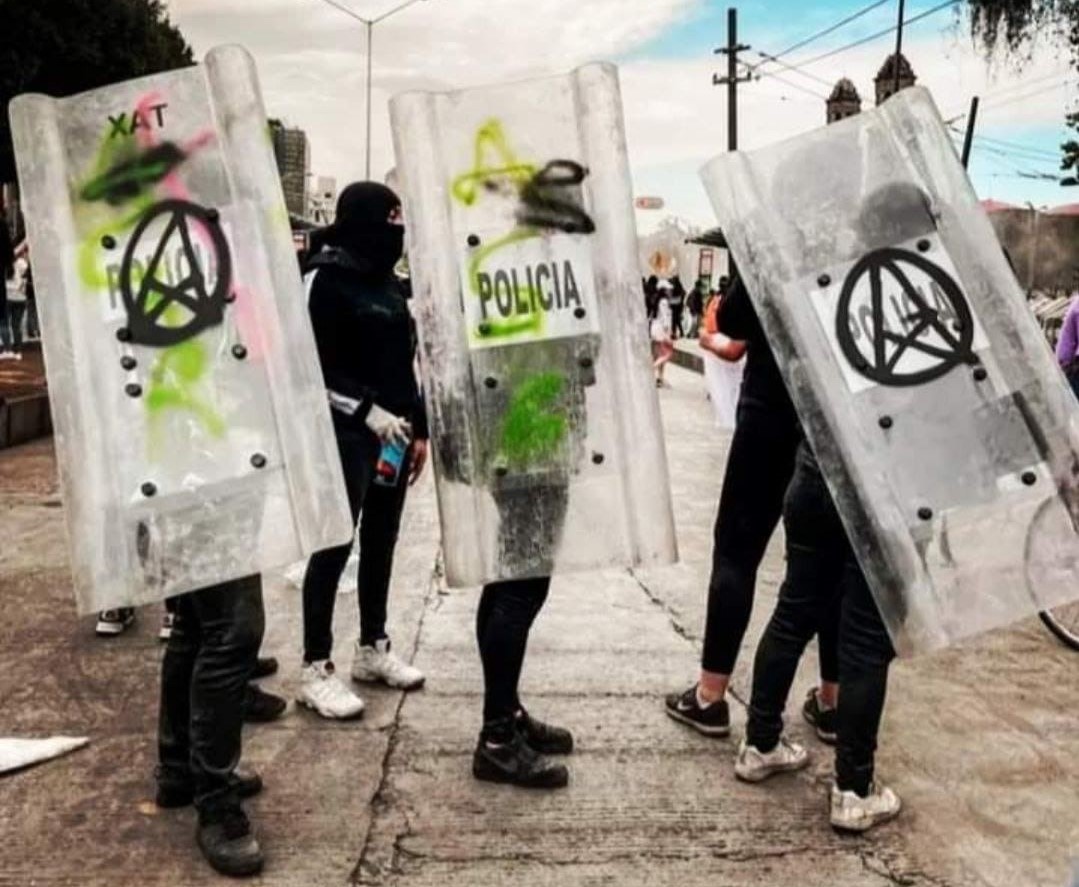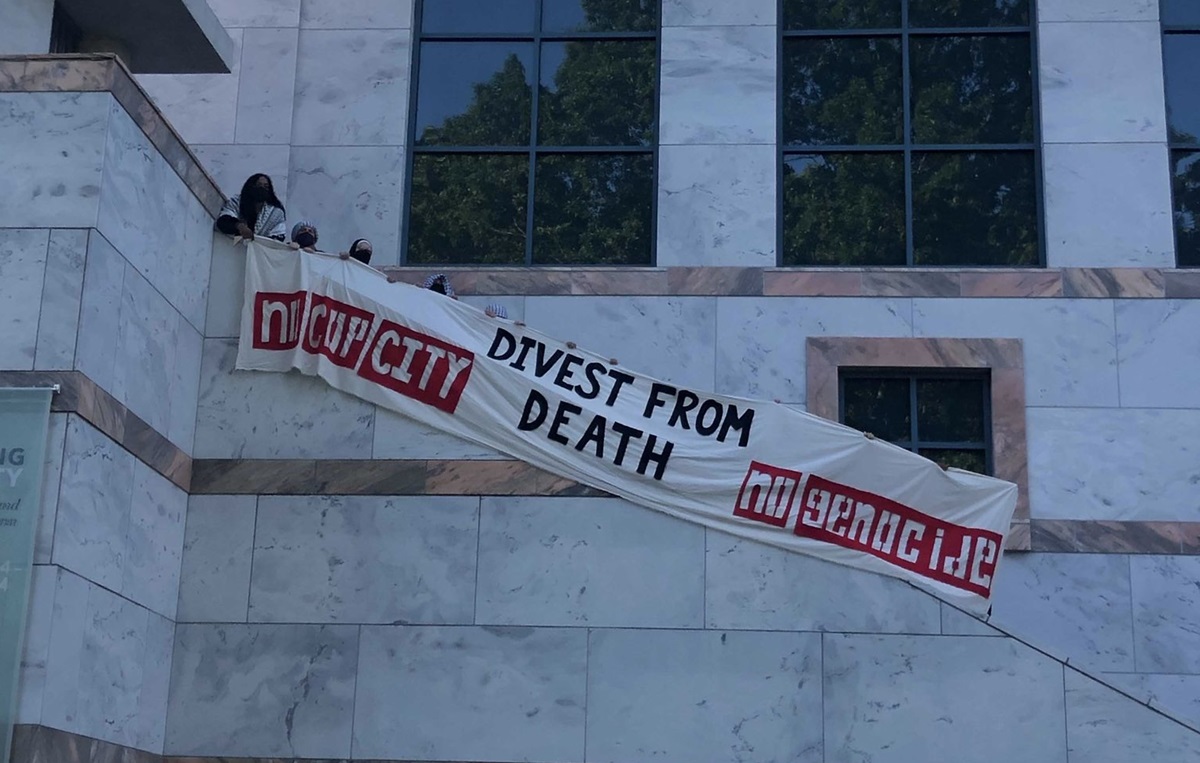Filed under: Incarceration, Midwest, Publication

Announcing a new issue of The Opening Statement, an abolitionist publication from so-called Michigan.
The Opening Statement is a free quarterly newsletter that features articles, poetry, political writing and opinion pieces, as well as other relevant pieces by non-incarcerated authors.
OPENING STATEMENT – WINTER 2024 (CLICK THE LINK TO DOWNLOAD PDF)
ARTICLES AND AUTHORS LISTED BELOW:
- RICO Expanded by Supreme Court Ray Luc Levasseur (1994)
- RICO and Stop Cop City: The Long War Against the Left Dan Berger
- Statement from Victor Puertas
- A Word from Victor on Palestine Victor Puertas
- If I Must Die / Si He De Morir Refaat Alareer
- The Abolitionist Logic of “Everyone for Everyone” Dan Berger
- True Leap Press
Dear comrades,
With this first issue of 2024, you may notice some changes to the design of The Opening Statement—a little bit different style, same great content.
Happy New Year! At least as happy as we can be in these terrible times. 2024 begins in the midst of multiple ongoing genocides. We’ve been following the Israeli state’s ongoing genocidal campaign against Palestine, and this issue of TOS includes a couple pieces on that topic. You may have heard that South Africa recently presented a case at the International Criminal Court officially charging Israel with the crime of genocide. We don’t have much faith in the efficacy of international law, but hopefully the case will help to undermine Israel’s legitimacy and marginalize it on the world stage. And even as the mass killing, displacement, and starvation of Palestinians in Gaza and the West Bank continue, genocide is also occurring in Sudan, the Congo, and West Papua. We hope to include information in future issues of TOS
on these cases as well.
Closer to home, we wanted to share a recent story out of Jackson, Mississippi, where 215 bodies were recently discovered in unmarked graves behind a state jail. According to a report on PBS, they were all buried there in the last eight years, and none of the families were notified. One case in particular seems to have been the one that led to the discovery of the site: that of a Black man named Dexter Wade, who was run over by a cop and later buried there, again without informing his family. Of course, this whole episode is just one piece of the more general phenomenon of police killings in the U.S. According to the organization Mapping Police Violence, cops killed 1,232 people in 2023, making it the deadliest year for police killings in more than a decade. Dexter Wade’s story, in which cops not only killed him but also tried to disappear his body, is a reminder that the numbers we have are almost definitely an undercount.
Next up, an update from the Michigan court of appeals: the new JLWOP law applies retroactively! We hope this brings some of you some hope that you can come home soon. We also want to share news of a package of reforms that will affect children caught in the juvenile legal system. In April 2020, staff tackled and asphyxiated 16-year-old Cornelius Frederick for 12 minutes in a Kalamazoo detention facility. Staff waited 12 more minutes before calling for help, and Cornelius died at the hospital two days later. His “crime” was throwing a sandwich in the cafeteria. He had been housed there because he was an orphan and the state failed to find him a foster placement. His death happened just a month before George Floyd was murdered by cops in Minneapolis in almost the same way. But since Cornelius was imprisoned, his homicide wasn’t captured on video and there was no international outcry.
A year after Cornelius’ death, the state formed a juvenile justice reform task force. A year after that, the task force published 32 recommendations. In December 2023, some of those recommendations were finally signed into law in the largest package of juvenile justice reforms in Michigan to date. If the 20 or so new bills are implemented as intended, they should lead to more consistency between counties, more community-based solutions, and less incarceration of youth overall. According to the Michigan Center for Youth Justice, “The comprehensive changes include increasing the Child Care Fund reimbursement for community-based services [compared to reimbursement for detention] and incorporating shelter and respite care. A significant step has been made in eliminating a majority of juvenile court fines and fees, which will alleviate undue burdens on countless families. The reforms also extend to expanding the Diversion Act, implementing risk screening and mental health screening tools, and strengthening the Office of the Child Advocate for enhanced oversight in juvenile facilities.”
The Detroit Free Press reported that one of the bills “would modify the factors a court would need to consider before trying a juvenile as an adult, only allowing previous delinquent behavior to be weighed if it would have also been considered a crime if committed by an adult. It requires considering the child’s developmental maturity, emotional health, and mental health, and the impact on any victim. If the juvenile is a member of a federally recognized Native American tribe, the court would also have to honor the culture and values of their tribe.”
It will be no surprise to abolitionists that promoting community-based solutions instead of detention for youth will actually save the state money. However, HB 4630 was one of the most important bills, and the senate failed to pass it because it would cost money. Did you know that not all counties guarantee qualified legal representation, or even any legal representation, for youth in the courts? The state prohibits the Indigent Defense Commission from giving the same legal services to children that they give adults, even though it’s a constitutional right for everyone. Poor children have fewer rights in Michigan courts than adults have! And Black children are over-represented in every aspect of the system. Even when youth do receive representation, the attorneys are not required to have any experience with youth or knowledge about adolescent development. This creates a multi-tiered system: different standards for children than for adults, and different standards for poor children than for wealthy children. Ironically, one of the bills passed does expand the State Appellate Defender’s Office to provide access to quality representation for youth at the appeals level, but they still don’t have it at the outset. The senators proved once again that they care more about money than about poor children—not to mention constitutional rights. Groups will continue to advocate for this bill.
None of this in any way eases the loss of Cornelius from the world, especially for those who knew and loved him. After all, he wasn’t even in the criminal legal system, he was an orphan without a community placement. Rest in power, Corn. Let’s fight on until all imprisonment, of youth and adults, is abolished.
We wanted to honor the life and memory of Sekou Odinga, the Black revolutionary who passed away on January 12, 2024. Odinga was an active member of the Black Panther Party and the Black Liberation Army from the late 1960s into the ’80s. He was convicted on RICO charges for helping Assata Shakur move to Cuba and spent 33 years in state and federal prisons before being released in 2014. Rest in Power, comrade!
Speaking of RICO . . . we’ve been calling this issue of TOS “the RICO special.” That’s because our main focus is the latest episode in the state’s repression against the movement to Stop Cop City in Atlanta. But this story has significant implications for all of us. As you might remember, Atlanta’s political and economic elites have been pushing to destroy a large urban forest and replace it with a $90 million police militarization facility known as Cop City. According to the Stop Cop City website, the facility will contain “military-grade training facilities, a mock city to practice urban warfare, explosives testing areas, dozens of shooting ranges, and a Black Hawk helicopter landing pad.”
The struggle against Cop City has brought together a wide variety of organizers, comrades, and community members with many different though often overlapping concerns, from police violence and racism to climate change and land defense, and they’ve used a diversity of tactics to prevent the project from going forward. The state’s tactics have been diverse as well, from bureaucratic obstacles and liberal co-optation to police violence, arrests, and murder—last year, cops killed a forest defender named “Tortuguita” in a hail of bullets while they sat inside their tent.
The latest attack on the movement has taken a legal form. In September 2023, the Georgia Attorney General Christopher Carr brought RICO charges against 61 people connected to the Stop Cop City movement in Fulton County, Georgia. RICO charges are significant because they can allow prosecutors to treat the actions of many different people—actions that often aren’t even illegal in and of themselves—as part of one big criminal conspiracy. As a result, if the state is successful with these RICO charges, it could become a model for the repression of leftist and revolutionary struggles across the U.S. Of course, this isn’t the first time RICO has been used against such movements. In order for us to be better able to protect ourselves, we’re including a classic essay from 1994 by Ray Luc Levasseur, the former leader of the United Freedom Front, who was convicted of RICO charges in 1986 after robbing banks to financially support the UFF. Levasseur’s essay describes the emergence of RICO charges as a technique of political repression and critiques the collaboration of mainstream liberal organizations in this process. What’s happening today to the Stop Cop City organizers is a consequence of this history. In addition to Levasseur’s original article from 1994, we are including an analysis comparing his RICO case with the current RICO case against Stop Cop City defendants, published in 2023 by the abolitionist historian Dan Berger.
We also include two statements by Stop Cop City defendant Victor Puertas, who has been held in ICE detention since his arrest at the Stop Cop City music festival in March 2023. Victor’s words link the violence of police and prisons to the militarized violence of the border and to the ongoing genocide in Palestine, shedding light on the structures of state violence and settler colonialism that join these seemingly disconnected sites of struggle.
Alongside Victor’s writings, we publish a poem by the Palestinian professor Refaat Alareer, who was murdered in a targeted airstrike by the IOF (Israeli Occupation Forces) on December 6, 2023. Alareer published a poem titled “If I Must Die” on Twitter on November 1, several weeks into Israel’s genocidal bombing campaign against Gaza. After he was killed, the poem went viral on Twitter and was translated into dozens of languages. The poem itself is a call back to a Claude McKay poem, one that has historic significance to the prison abolition movement in the US (rhymes with Schmattica). As a reflection of the poem’s wide circulation, we include a Spanish translation along with the original English version. We also included a companion piece, also by Dan Berger, on the abolitionist logic of the demand from the families of Israeli hostages captured in Operation Al-Aqsa Flood for the Israeli government to agree to Hamas terms and release the thousands of Palestinian prisoners held in Israeli prisons: “Everyone for everyone.” Berger’s essay reflects on the slogan’s political implications in the face of the unequal valuation of different people’s lives and points to a political horizon of genuine safety.
An update regarding the TOS book club: if you requested the latest round of books that were announced in the last issue, the orders have been placed. We’re not sure how long it will take for them to arrive, but feel free to follow up letting us know if you have or haven’t received them. Also, once you read either or both books, we are really interested to hear what you think! Send us your reviews or reflections, and let us know if it’s something you’d like to be shared in a public way (i.e. as a zine or blog post or posted on social media). As we mentioned in the original announcement, we are hesitant to publish prisoner writings in the newsletter because MDOC will block it, so we are trying to figure out other ways to share your writings. Last but not least, a few of you mentioned that you were interested in corresponding with a pen pal about the books. Unfortunately, the book club doesn’t have the capacity to organize this right now, but as always we are down to correspond as much as we can about the books and whatever else is on your mind. We also hope to engage our outside networks with the same books, and with your reflections on them. Maybe you’ll see their responses in a future TOS.
Finally, we are always interested in your observations, reflections, thoughts, criticisms, or whatever else you want to share with us about the situation at the prison you’re being held at. For example, has anything changed with the staffing issues? As we write this introduction, we’re experiencing some extremely cold temperatures and heavy snow. How is the weather affecting you? We’ve heard some prisons may have lost power—if that happened where you’re at, we’d be interested to hear more.
With love and rage,
MAPS
Photo by Michael Dziedzic on Unsplash




